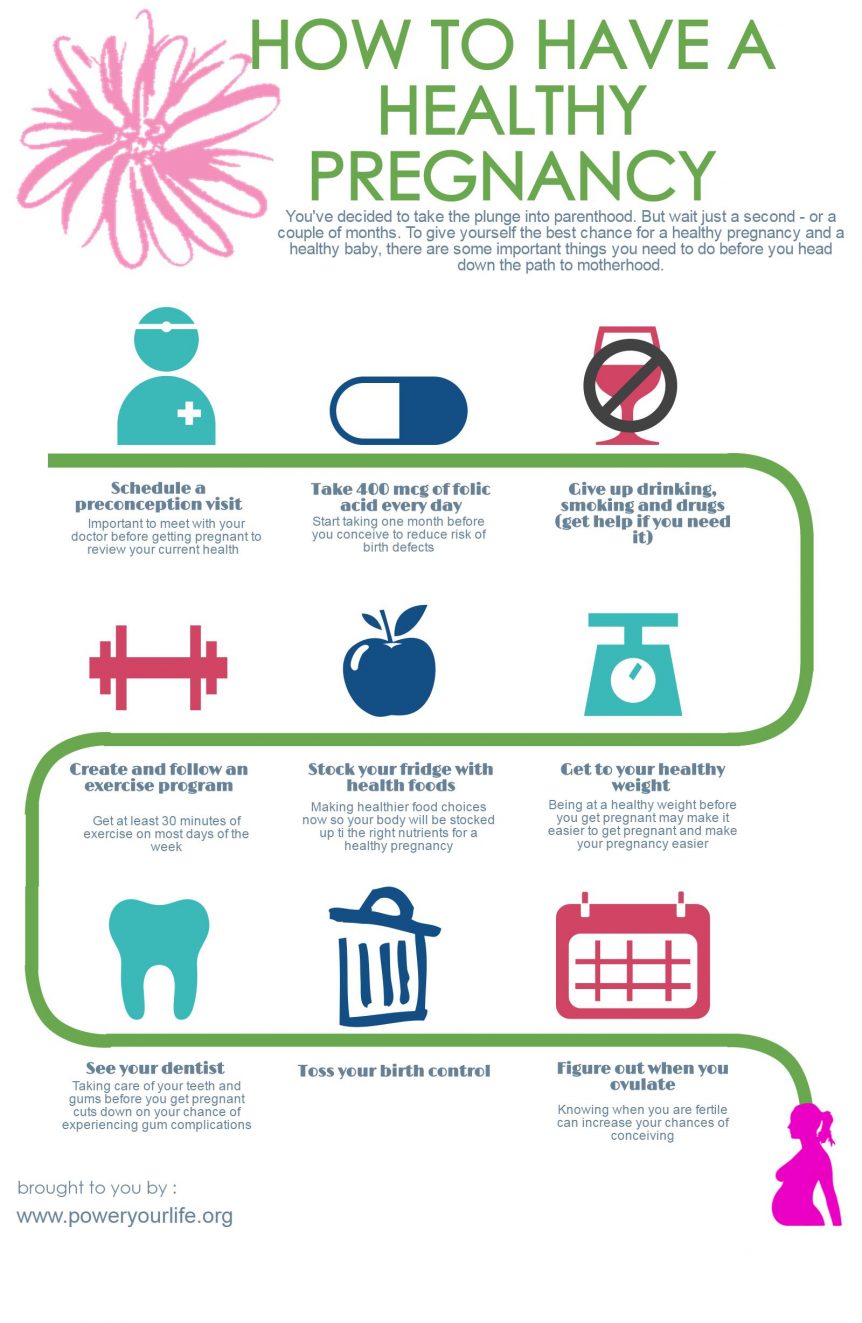You have decided it is time to add to your family. But wait just a second – or a couple of months. To give yourself the best chance for a healthy pregnancy and a healthy baby, here are some important things you need to do first.
1. Schedule a preconception health visit with a health care provider at least three months before you become pregnant.
This visit gives you the time and space to talk about your desire to get pregnant. Before you go, be ready to talk about your:
Reproductive History: Includes any past pregnancies, miscarriages, stillbirths, or abortions. Tell your provider if your periods are regular, and about your past and current birth control use, past Pap test results, and any sexually transmitted diseases or other infections you have had.
Medical History: Health conditions like diabetes, asthma, or high blood pressure can harm a pregnancy. It is best to work with your healthcare provider to control any health conditions before getting pregnant.
Mental Health History: Talk to your healthcare provider about any history of mental health conditions, both past and current. Poor mental health that is not well controlled before pregnancy may increase the risk of postpartum mental illness, substance abuse, and less care during pregnancy. Always talk to your provider before stopping any medication.
Current Medications: Tell your provider about all the medications you are on, including prescription, over-the-counter, and any vitamins or herbal supplements you take. Some medicines can increase your risk of miscarriage or having a baby with birth defects. Your doctor or midwife can help you review your medications so you can stay healthy and keep your baby healthy. It is never a good idea to stop taking a prescription medication without talking to your doctor or midwife first.
Home and Workplace Environment: Tell your doctor or midwife if you or your partner works or lives around possible hazards – such as cat feces, x-rays, and lead or solvents. Some of these things can affect your ability to get pregnant or maintain a healthy pregnancy.
Screenings and Exams: Your healthcare provider or midwife will check your weight and blood pressure. You may also want to get a Pap test and pelvic exam done if you have not gotten one in the last year. Finally, make sure all your immunizations are up to date and get any you may be missing.
2. Take 400 micrograms (mcg) of folic acid every day.
Found in most multivitamins and fortified foods like cereal, bread, and pasta, folic acid is a B-vitamin that is needed for proper cell growth. To get enough folic acid, women should take a daily multivitamin and eat a healthy diet that includes folic acid-rich foods like leafy greens and whole wheat grains.
Folic acid is very important for the health of your baby. Studies have shown that, if taken every day for at least one month before getting pregnant and during the first trimester of pregnancy, folic acid can reduce the chance of birth defects of the brain and spine called neural tube defects. New research also suggests that folic acid might reduce the risk of other birth defects, such as cleft lip and palate and some heart defects.
3. Give up drinking, smoking, and illegal drug use.
Smoking, abusing alcohol, and/or using illegal drugs by either your or your partner could harm your pregnancy and your baby. If either you or your partner is using any of these substances, ask your provider for help quitting before getting pregnant.
4. Reach a healthy weight.
You will want to try and reach your healthy weight, based on BMI, before getting pregnant. Being overweight or obese can make it harder to get pregnant and increase your risk of experiencing problems. Being underweight may raise your risk of delivering a low-birth weight baby.
5. Develop or maintain healthy eating and exercise habits.
Get in the habit of healthy eating and regular exercise before getting pregnant. These habits will help you stay healthy all through your pregnancy and life.
6. See your dentist.
It is a good idea to schedule a teeth cleaning, especially if it has been a while since your last trip to the dentist. Some studies have shown a link between gum disease and having a premature or low-birth weight baby. Treating oral health problems before getting pregnant may prevent future health problems in you and your baby.
7. Stop using birth control.
Most women can get pregnant almost immediately after stopping birth control, no matter how long you use it.
Some women who use the birth control shot (Depo-Provera) may take longer to begin ovulating after stopping, so it may take longer to get pregnant. It may take up to 13 weeks after your last shot to begin ovulation. If you still have not had a period a year after your last shot, see your health care provider.
8. Figure out when you ovulate.
By watching and following your menstrual cycle, you can track when you have released an egg (ovulation) and are more likely to get pregnant. You can use a calendar or phone app to track your periods and ovulation to increase your chances of getting pregnant.
Learn more about your menstrual cycle and ovulation by visiting our GETTING PREGNANT section.

